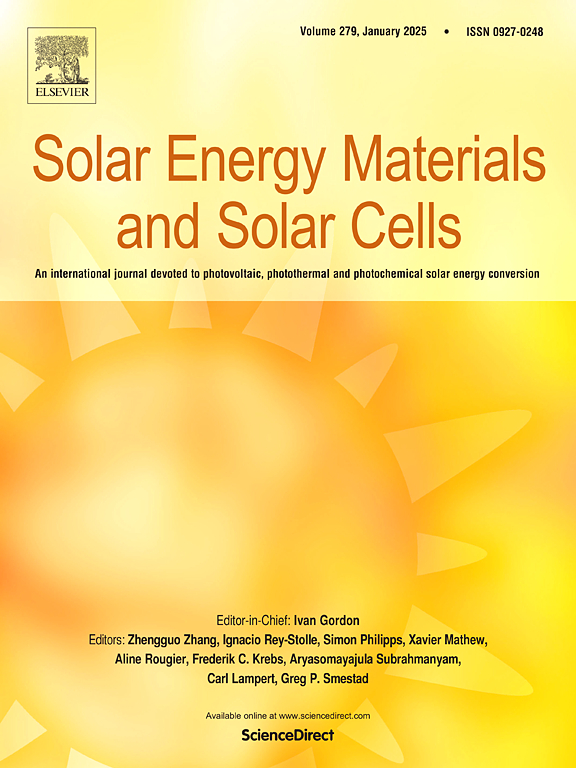Effects of partial shading and temperature-dependent reverse bias behaviour on degradation in perovskite photovoltaic modules
IF 6.3
2区 材料科学
Q2 ENERGY & FUELS
引用次数: 0
Abstract
The vulnerability of perovskite solar cells (PSCs) to reverse bias caused by partial shading in the module and current mismatch in tandem configurations present significant challenges for the commercialisation of PSCs, particularly in terms of their performance, durability, and safety. In this study, we investigated the effects of partial shading on perovskite photovoltaic (PV) modules and the temperature-dependent reverse bias behaviour in solar cells. Partial shading of perovskite PV modules degrades their performance, but light soaking restores it, indicating that the reverse-bias-induced changes are induced not only by permanent damage but also by reversible changes. Furthermore, the reverse bias effects on the solar cell, which cause the degradation of the modules under partial shading stress, are reversible. Additionally, the reverse-bias behaviour is highly dependent on temperature, indicating that temperature-dependent ion migration under an applied reverse bias leads to changes in the reverse-bias behaviour, such as reversible properties and enhanced modification at elevated temperatures. Our findings demonstrate that unravelling the properties hidden by ion migration is crucial for assessing the intrinsic durability and reliability of PSCs and understanding the effects of partial shading in perovskite PV modules.
部分遮光和随温度变化的反向偏压行为对过氧化物光伏组件降解的影响
由于模块部分遮光和串联配置中的电流不匹配,过氧化物太阳能电池(PSC)容易受到反向偏压的影响,这给 PSC 的商业化带来了重大挑战,尤其是在性能、耐用性和安全性方面。在这项研究中,我们调查了部分遮光对包晶石光伏(PV)模块的影响,以及太阳能电池随温度变化的反向偏压行为。部分遮光会降低透辉石光伏组件的性能,但光照浸泡会恢复其性能,这表明反向偏压引起的变化不仅是由永久性损伤引起的,也是由可逆变化引起的。此外,反向偏压对太阳能电池的影响也是可逆的,这种影响会导致组件在部分遮光应力下性能下降。此外,反向偏压行为高度依赖于温度,这表明在施加反向偏压的情况下,依赖于温度的离子迁移会导致反向偏压行为发生变化,例如在高温下的可逆特性和改性增强。我们的研究结果表明,揭示离子迁移所隐藏的特性对于评估 PSCs 的内在耐久性和可靠性以及了解过氧化物光伏组件中部分遮光的影响至关重要。
本文章由计算机程序翻译,如有差异,请以英文原文为准。
求助全文
约1分钟内获得全文
求助全文
来源期刊

Solar Energy Materials and Solar Cells
工程技术-材料科学:综合
CiteScore
12.60
自引率
11.60%
发文量
513
审稿时长
47 days
期刊介绍:
Solar Energy Materials & Solar Cells is intended as a vehicle for the dissemination of research results on materials science and technology related to photovoltaic, photothermal and photoelectrochemical solar energy conversion. Materials science is taken in the broadest possible sense and encompasses physics, chemistry, optics, materials fabrication and analysis for all types of materials.
 求助内容:
求助内容: 应助结果提醒方式:
应助结果提醒方式:


